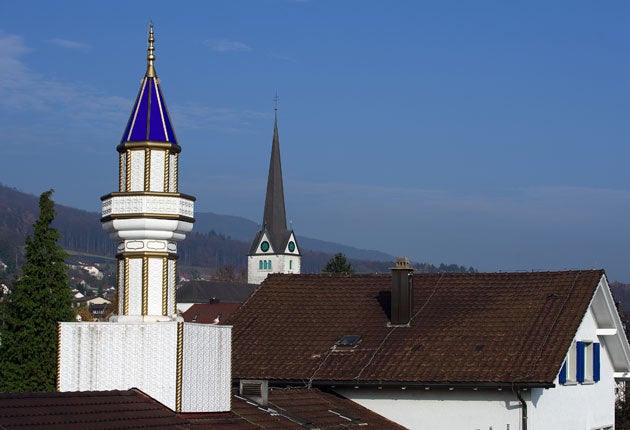Switzerland votes to ban the building of minarets
Swiss government stunned as xenophobic fringe parties exult

Your support helps us to tell the story
From reproductive rights to climate change to Big Tech, The Independent is on the ground when the story is developing. Whether it's investigating the financials of Elon Musk's pro-Trump PAC or producing our latest documentary, 'The A Word', which shines a light on the American women fighting for reproductive rights, we know how important it is to parse out the facts from the messaging.
At such a critical moment in US history, we need reporters on the ground. Your donation allows us to keep sending journalists to speak to both sides of the story.
The Independent is trusted by Americans across the entire political spectrum. And unlike many other quality news outlets, we choose not to lock Americans out of our reporting and analysis with paywalls. We believe quality journalism should be available to everyone, paid for by those who can afford it.
Your support makes all the difference.The spectre of religious and racial intolerance was raised over Switzerland last night as a majority of voters backed a deeply controversial proposal to ban the building of minarets at mosques in a referendum which instilled fear among Muslims and shocked the Swiss government.
The result, which followed a series of unprecedented stone-throwing attacks on mosques, astounded political observers as it was the opposite of what opinion polls had been predicting for months ahead of the plebiscite initiated and partly organised by the ultra- conservative Swiss People's Party (SVP.)
Surveys had suggested that the proposed ban was favoured by only 35 per cent of the electorate. However, according to first results yesterday, support for the proposal appeared to have topped the 57 per cent mark. "It is a huge surprise," the country's French-language television station said.
Observers said the resounding "No" to minarets came after a vigorous campaign to mobilise voters by the SVP and the country's smaller but equally xenophobic Swiss Democratic Union. Posters in support of the ban showed a menacing-looking woman in a black Burka posing next to missile-like minarets standing on top of the Swiss flag.
Ulrich Schluer, a triumphant SVP MP, welcomed the result and claimed that the referendum had helped to foster integration by encouraging debate on the issue. Rejecting charges that his party had encouraged discrimination he insisted: "Every Muslim in Switzerland is allowed to come together with other Muslims to have their religion together. But a minaret is a political symbol. It is a symbol for introducing step by step sharia rights in Switzerland. Forced marriages and other things like cemeteries separating the pure and the impure – we don't have that in Switzerland and we don't want it," he said.
Members of Switzerland's 400,000-strong Muslim community which accounts for around 5 per cent of the country's 7.5 million population, were shocked and clearly intimidated by the result. Tamir Hadjipolu, the president of Zurich's Association of Muslim Organisations, said that Swiss Muslims would live in fear if the ban went ahead.
"This will cause major problems because during the last two weeks of this campaign different mosques were attacked and we have never experienced this in 40 years of living in Switzerland. With the campaign, Islamophobia has increased very intensively," he said. "The initiators have achieved something everyone wanted to prevent, and that is to influence and change relations to Muslims and their social integration in a negative way."
One of the main targets of the so far- unidentified assailants who have attacked Muslim buildings in recent weeks was the country's largest mosque in Geneva. A pot of paint was hurled at the building on Thursday and in another attack the mosque was hit with cobblestones. No one was hurt in either attack but the premises have since been placed under a round-the-clock police guard.
Although it disapproved of the ban, the Swiss government was obliged by law to accept the result of the referendum. "The government respects this decision. Consequently the construction of new minarets in Switzerland is no longer permitted," it said in a statement. The Swiss Justice Minister, Eveline Widmer-Schlumpf, said the decision was "not a rejection of the Muslim community, religion or culture".
Switzerland's Muslim population is comprised mainly of Turks, Bosnians and Albanians. Many are refugees from the Yugoslav wars of the 1990s. According to government statistics, fewer than 13 per cent practise their religion. None of the country's mosques,including the four that have minarets, broadcast the call to prayer in public.
The Swiss government had urged voters to reject a ban on minarets, fearing unrest within the Muslim community, damage to Switzerland's image abroad and an economic boycott by wealthy Muslims who bank, shop and take holidays in the country. The referendum has also received wide coverage in the Muslim media.
Most of Switzerland's established political parties had opposed the ban in the run-up to the poll. In a joint statement they said: "It will be met with incomprehension abroad and damage Switzerland's reputation."
Join our commenting forum
Join thought-provoking conversations, follow other Independent readers and see their replies
Comments